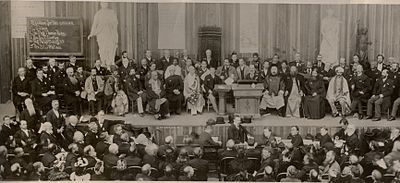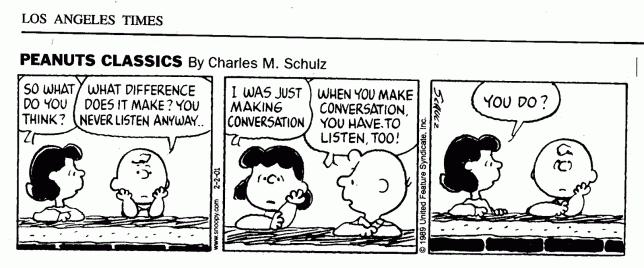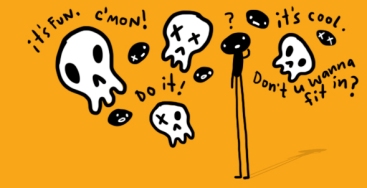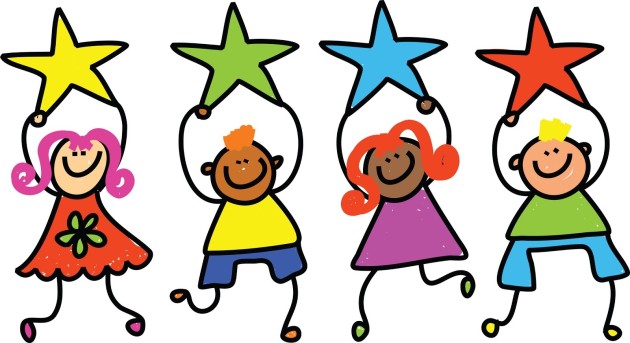Importance of Holistic Education
Posted: May 13, 2016 Filed under: Teacher's Desk | Tags: Beat Negative pressure, Child Care, Education, Extracurricular activities, help kids, Holistic Education, Parenting, School Life, summer holidays, teach Effectively, teaching tips Leave a commentTeachers have multiple roles. They teach, they inspire and they motivate children. Often, all these functions are concentrated towards achieving higher marks in exams. This often burdens those children who are capable of being creative and are skilled at pursuits that are not examined through report cards. There is a famous TED Talk by Ken Robinson about how schools kill creativity.
Among his musings is one that has stuck profoundly, which we paraphrase: “teachers try to create more teachers”, not dancers, not singers, or not even engineers! We were therefore inspired to create this post, to remind our teachers the importance of activities that fall outside the curriculum.
Schools typically have two classes for co-curricular activities. Even that is often cut short on, during exam days, citing the need to ‘completing portions’ and for ‘course revision’. This has a debilitating effect on the children’s perspective on education. When the fun in school is taken out, education systems stand as roadblocks to children’s creativity. We must work towards bringing down those barriers. Let’s examine why, and how.
Co-curricular activities make education delightful!
What is the point of reciting a poem, if children are unable to create some of their own? Co-curricular activity should invigorate and stir the creative conscious of children. What is the use of knowing different forms of speech, if children are unable to piece together their opinions in debates? Co-curricular activity should make use of the curriculum at hand. Introduce poetry in English class, encourage children to write stories, ignite debates in class, and watch as children pick up the art of speaking boldly, clearly and smartly.
Extracurricular activities are a window to the world out there.
What would school be without a science exhibition? A shell, that’s what! Science exhibitions, English plays, Olympiads are wonderful ways of exposing students to greater heights in fields of their interest. To this end, we must also consider scholarships, which not only are the result of extracurricular interests shown by the students but something that will also help them in their higher studies. For example, prestigious scholarships such as Kishore Vaigyanik Protsahan Yojana (KVPY) are awarded to students who take the time out to pursue extracurricular studies in basic sciences.
All work and no play makes Jack a dull boy.
Playing a sport, dancing to the tunes of classical and/or popular music, singing soulfully, drawing caricatures, enacting plays, and so much more are activities that jolt children into the wonderland of studying the world around them! The pursuing hobbies is a lifestyle choice for people, and it would best be realized when encouraged throughout childhood. Hobbies such as dancing, sometimes, can even lead to careers in dance! Such offbeat careers are very much possible today, with guaranteed success. Similarly, our classrooms are probably hosting little Tendulkars who are discouraged from taking up a hobby they love. It’s the duty of us, the teachers, therefore, to allow children space and time to explore their interests and to pursue it with all their heart.
The best kind of education for the children should be a holistic one. Every child has an all-rounder in him/her. It is up to the teacher to harness the talents hidden in the children, without rules or prejudices about what constitutes education and what doesn’t. We aren’t saying all-rounders are those who can extempore with flair, who can read fiction for hours together, who can enact Shakespeare with panache, and who can score a goal in a football match are rare to come by. All-rounders are those who can enjoy all these activities, without feeling in any way less smart than children who can score centum in exams!
Let’s celebrate ALL our children; the painters and debaters alike, the toppers and footballers alike. Let’s ensure our children grow into excellent adults, with the education that’s holistic and well rounded. Let’s always remember that every child is a shining star in his/her own right. Let’s celebrate that awesomeness!
How To Be a Better Orator
Posted: March 23, 2016 Filed under: Student's Den | Tags: communication, help kids, School Life, summer breaks, summer holidays Leave a commentIt was a cold evening. An Indian young man stood before an audience that had pre-judged him to be an inferior. He said, in very simple language, “Sisters and Brothers of America,” and he had their attention. The man was Swami Vivekananda.

The assembly in Chicago, to which Swami Vivekananda delivered his famous speech [Source – Wikipedia]
Being a good orator allows you to express what you want to convey effectively, it ensures your audience is listening to you, and only you. In our great freedom struggle, we have had stellar orators who have since been recognized as some of the greatest ever, in the world. Notable examples are Pherozeshah Mehta, Gokhale, Gandhi, Nehru, to name a few.
Oration, these days, is an art that can be learned, for example, Toastmasters are a group of people who practice oration regularly. The best-known orator in the world today used to stutter when he was a child! So, yes, even if you weren’t born a great orator, you can definitely become a great one, with practice and with skill.
The importance of being a good communicator
Anything that requires more than one person to work on it requires good communication between the people. Be it a football match, or a telephone conversation. If you’re not a good communicator, you’ll needlessly spend too much time trying to explain yourself. You might also miscommunicate.
Take for example, you need to tell your teacher that your parents cannot attend the parent-teacher meeting. If you tell her, “my parents won’t attend the meeting,” you will not only sound rude, but you will also be miscommunicating. The teacher might have built an opinion that your parents are refusing to attend the meeting! While in fact, they are unable to, even though they would like to.
Here, not only has the student failed to communicate, but even the teacher would be failing to communicate with the child, if he/she did not probe into the matter to understand why the parents won’t make it to the meeting. Communication is a two-way thing.
Components of effective communication are – a good hold on the language of communication, and more importantly, being a good listener!
How to communicate better
“The single biggest problem in communication is the illusion that it has taken place” – George Bernard Shaw.
Never assume that communication has taken place, always ensure it. Even if the person you are talking to is nodding, you must repeat yourself to ensure the person is not just listening to you, but that he or she also heard you. Likewise, if you don’t understand something, you must ask the speaker what he or she means by what he or she said!
Communication, like we said above, is a two-way thing. It really takes two to tango. For effective communication, it is important to convey your message effectively. It is also equally important to listen and pay attention while being addressed.
If you’re a bad listener, people won’t listen to you either! Being a good listener is not only important for being a better communicator, but also for building and sustaining strong friendships & relations (all those secrets and fun are wonderful examples of good communication!).

[Source – Peanuts Comics]
Extra and fun resources, to be an effective communicator:
Here’s a wikiHow on how to communicate with a person with the hearing disability.
To get better at communication, specifically oration, you must participate in extempores, speeches, and the likes.
Also, since the summer vacation is about to begin, some popular games you can indulge into to improve communication skills are dumb-charades, Pictionary, and similar team activities or you can also enroll yourself for an English Vocab course at Vedantu and learn the skill from the comfort of your home.
Easy & Useful Tips to Revise the Syllabus in a Day
Posted: February 26, 2016 Filed under: Student's Den | Tags: Beat Negative pressure, Education, examination, Gifs, help kids, homework help, how to study, School Life, study hacks 2 CommentsExaminations are approaching and nightmares have already started paying visits to many students at nights. You want to go through each subject before the outset of the examination days. You devoted all your time, but it seems almost impossible to review all the contents of the chapter in such a short time. If it is the same story with you, then we have come up to give you a hand.
Just bring the following changes in your way of preparation and you will enable yourself to take up examinations with high ounces of confidence.
Befriend Your Clock

Start by making a timetable and follow it religiously. Divide the chapters according to the score value. Some topics may be too long, but stand rare chances of being asked in the exam, keep them for the last. As you have limited time, so it becomes utmost necessary to utilize each second of the hour wisely.
Make Space for Yourself

It is important to find a peaceful place to study. The place you choose should be away from all the distractions and the crowd. Places like a library or any other silent room work best. An appropriate environment connects the mind to work. A calm and relaxed mind works more efficiently and with greater concentration.
Make Quick Notes

You have countable hours and you should not kill time by writing down long and beautiful notes. Try keeping your notes short & clear yet informative. Make flowcharts, diagrams, tables and bullet points. You can also use mnemonics and slangs for the quick recapitulation.
Effective Time Utilization

Be wise, and make your time plan effectively. It is not the time to touch new topics. New things take a lot more time to be understood and this hampers the entire plan. Instead, devote that time in re-revising the learned topics and cement them in your memory.
Take Breaks

Our brain also experiences fatigue as our body. If you overload it, it begins to lose the information stored. It is advisable not to sit and study for long hours constantly. You can take naps, listen to soothing music, go for a walk or take breaks to grab a bite. Monitor the time and keep it short.
Take up a Test

Questions from previous years’ paper and classroom tests are of extreme use. You should try 4-5 papers for each subject. These papers provide a good collection of questions and you can also check your preparation while solving them. Fix the hours for completion and act honestly.
Say Bye to the Hi-Tech World

Limit your time spent on the social networks and web surfing. Also, try to keep a minimal dependency on gadgets and the Internet. Although you can make a good use of the Internet by solving online papers or watching videos around question solution, avoid doing it at the last moment. Make sure you also reduce your dependency on the calculator with small calculation hacks.
Eat Healthy

Food is the fuel for your brain. Do not compromise with meals. Avoid junk food as they release free radicals and leads to slow brain damage. Eat fresh and healthy food to energize your brain. Items like fruits, eggs, green vegetables, peas and pulses are full of nutrients and work best.
Meditation

You have been working too hard, so take up activities to distress your body and mind. Sit upright, fold your hands and do breathing exercises. It will improve blood circulation to your brain. You will also get rid of impatience and uneasiness, which takes you long way in the examination hall.
Work with Art

Make stick-on and flashcards to memorize important dates, events, definitions and formulas. It is easy to carry them anywhere and revise. Revising multiple times assure building a great memory of it and this would definitely help you reduce retrieval time in the examination hall.
Don’t let examinations provoke panic, make a smart move. We are sure these tips from Vedantu will definitely help you in revising the syllabus quickly and maintaining the peace of mind. Excellence can only be achieved through confidence and determination.
Is Food Important In a Student’s Success Story?
Posted: February 3, 2016 Filed under: Parent's Park | Tags: Eat to Succeed, Exam, examination, help kids, how to study, Parenting, School Life, study hacks Leave a commentWe are sure, you keep everything prepared that can help your child to shine out in the examinations, but something always curtails his best possible achievement. Does it always bother you and your child that how his fellow classmates manage to excel? Your child must have done all his/her preparation, but have you contributed rightly? They say that food plays an important role in physical and mental health. It is important to watch out what you serve on the plate.
Food is for the body, but healthy food is both for body and mind
We will here enlist a few food sources that are essential for mental exercise and help you to improve kid’s performance.
Bowl full of grains

It is important to keep the body active and energetic. The right choice of grain generates the full amount of energy for better performance. Eating more of refined cereals leads to fatigue and lethargy. Switch to preparation with whole grains for the same meal. It has a reversal action that increases the concentration and focus. It helps in improving memory function as well.
Drink enough water

Water hydrates the brain. Advise students to drink 7-8 glasses full of water in a day to have a healthy glow and cool mind. A dehydrated brain can cause headaches, loss of focus and mood swings.
Go nuts!

Nuts are a good source of essential fatty acids, as well as iron. Iron increase the binding of oxygen with hemoglobin and thus provide sufficient oxygen to the brain to perform. Nuts like almond, walnut and pistachios help in enhancing alertness. They are also a good source of vitamin E, which is important for glowing skin and delays ageing.
Veggie affair

It has been seen that dark green leafy vegetable stays longer in the stomach and subsequently satisfies the hunger. They are a good vegetarian substitute for fish for obtaining omega-3 fatty acid.
A neurological study has found that people consuming spinach in their daily diet have a better focus than their mates. A folic acid source; Spinach has a unique property of reversing the memory loss. Vegetables like cabbage, broccoli, etc. also improve the gut motility and thus regulates the bowel functionality of your system.
Love for dark chocolates

Dark chocolates release pleasure in the mouth and antioxidants in the blood. Antioxidants fight against free radicals, which are destructive elements to the brain and other vital organ activity. Ultimately, it increases the alertness, clarity in perception and improves blood flow.
Feed on fish

Fish is a brain food. It is a must-have component in a student’s diet. It provides proteins, Omega-3 fatty acids and rare minerals like zinc. Most importantly, it lowers the risk of dementia (memory loss). It additionally augments the mental fitness for effective and efficient studies.
Fruit punch

Fruits are rich sources of important vitamins (including A, B, C, and D) Fruits from the berry family (like blueberry, tomatoes, strawberry, cranberries, black currant, grapes, etc.) makes up for the free radical damage in the brain. In particular, they decline the risk of Alzheimer’s syndrome (Permanent short-term memory loss with advancing age). They also promote recalling power and concentration.
Adding all these superfoods in your diet will definitely add to your hard work and will reproduce in the results. Eating the right food will enhance the function of the brain and greases the neural system. When you study & revise perfectly, it becomes mandatory to retain and produce the same on the examination sheets. So, eat to live and eat right to succeed!
Image source – Google Images
Learn Anytime Anywhere with InstaLearn
Posted: November 23, 2015 Filed under: Product | Tags: assignment help, Doubt-clearing Sessions, help kids, InstaLearn, Instant learning online, instant teacher connect 1 Comment
 Do doubts stop you from being ahead of others? Not anymore!
Do doubts stop you from being ahead of others? Not anymore!
We understand ‘doubts’ make anyone go bonkers. Especially for students, doubts are deterrent and if not curbed at the right moment, it can affect the academic performance to quite an extent. We are here with ‘InstaLearn’ feature that will allow students clear their doubts from teachers of their choice in as quickly as 10 sec*.
Now, squash the doubts as they occur with the InstaLearn feature at Vedantu. The process is super-easy. All you have to do is take a couple of steps to clear your doubts.
Quick 3-Steps to Clear Your Doubts
1- Choose ‘Clear Doubts Now‘ option on Vedantu home page
 As soon as you come across a doubt, the simplest way to clear it is to log on to Vedantu.com and select the ‘Clear Doubt Now’ section on home page.
As soon as you come across a doubt, the simplest way to clear it is to log on to Vedantu.com and select the ‘Clear Doubt Now’ section on home page.
2- Share your doubts

As soon as you hit the ‘Clear Doubts Now’ you are taken to InstaLearn page that asks you to select your class and subject and submit your doubts to be shared with teachers. The best part is, you can upload pictures, share links or your type in your doubts.
3- Book an instant session

Once your doubt is successfully submitted, you can see a list of teachers who can help you clear your doubt. You can choose the best teacher to clear your doubts based on your preferences. After you have decided on the teacher, you can straight away head to book your instant session. Once you make the payment, your session starts in mere 10 secs.
Take the Live Session & Clear Your doubts
Voila, you are now connected with the teacher of your choice over an instant doubt clearing session in three simple steps. Go ahead and clear your doubts.
The best part is, there is no minimum time duration for the session. You can end the session as soon as you are cleared of your doubts.
Isn’t it simple! All you have to do is collate your doubts and get them cleared instantly from the teacher of your choice. We are pretty sure this will help you overcome academic anxiety and be successful in your journey to learn.
Peer Pressure and How to Help Kids Handle It
Posted: June 22, 2015 Filed under: Parent's Park | Tags: Beat Negative pressure, help kids, Peer Pressure, psychology, school pressure 1 Comment What is Peer Pressure? Dictionary defines peer pressure as ‘the social influence a peer group exerts on its individual members, as each member attempts to conform to the expectations of the group.’ In simple terms, if your kid wishes to do something that would project him/her cool in his/her group, without a personal liking towards it – this should ring a bell of peer pressure in your mind. It is most likely that this pressure would encourage your child to develop certain unhealthy habits. Here in this blog, we’ll attempt to make you aware of the ways to handle and overcome peer pressure.
What is Peer Pressure? Dictionary defines peer pressure as ‘the social influence a peer group exerts on its individual members, as each member attempts to conform to the expectations of the group.’ In simple terms, if your kid wishes to do something that would project him/her cool in his/her group, without a personal liking towards it – this should ring a bell of peer pressure in your mind. It is most likely that this pressure would encourage your child to develop certain unhealthy habits. Here in this blog, we’ll attempt to make you aware of the ways to handle and overcome peer pressure.

Why Your Children Fall Prey to Peer Pressure? Most probable cause of falling prey to peer pressure is desire to be liked and admired by the group or influencers of the group. Children also give in to peer pressure because they are worried of being rejected or made fun of. Some go ahead with it, just to curb their curiosity and others get influenced to try out what everyone else is doing. A few other likely reasons can be – not being sure of what to do, don’t know how to say a ‘no’, and don’t want to feel awkward of having difference of opinion with the group. How it Can Affect Mostly the peer pressure is associated with increased negative or risky behaviors in kids and adolescents. As human tendency, children are more prone to adapting to negative behavior than to positives and peer-pressure accelerates the rate. Generally peer-pressure is held responsible for smoking, cheating, shoplifting, bullying, and unethical and unsafe use of cell phones and social media by kids and adolescents. It also boosts physical abuse and violence among middle and high school students. Although peer pressure is mostly associated with negative behavior, but when in moderation, it also helps build some positive behavior in your children. It supports children to adjust in a group, it also encourages them to try new sports, activities, food, music, etc. Additionally, it motivates children to meet new people and workout the difference of opinions. It’s just that you have to be little aware of what’s going on in your kids day-to-day life to ascertain whether the peer-pressure is helping or breaking him/her.
How You Can Help Kids Deal with Peer Pressure Positively –
- Teach Them to Say ‘No’

Saying a ‘No’ to something that everyone around you is doing is a little difficult. But teaching your child to take the right decision is very important. One of the best ways to teach is to do a role-play with your kids and train them to say a ‘no’ during various obnoxious situations
- Build Good Self-Esteem in Your Kids

Are you too chicken? Is the common phrase used by influencers to prey upon group members. Teach your kids to be high on self-esteem and not to fall prey to such phrases. Studies show that children who are happy inside and feel good about themselves, are more likely to make better choices and resist negative peer pressure. So, do make it a point to appreciate your children for small achievements and reward them positively.
- Help Them Choose Their Friends Wisely
Children learn a lot from their friends and surroundings during their growth years, it is very important to interact with them regularly to be sure of their learnings. Friends and peer play a very important role in shaping up kid’s behavior. Help your kids choose friends with good moral values, virtues and superior self-esteem – this will go a long way in keeping your child away from unwanted peer pressure and risky behavior.
- Get Involved in Your Kids’ Lives

To make your kids listen to you and follow the rules made by you, it is very important to get involved with them in their lives. Take interest in their friends, their likes, and their fears. Do talk to them about their interest, aspirations, how they are spending their leisure time, who is new on their social network. Getting involved with your kids boost his/her confidence and helps him/her make an informed decision and avoid unnecessary peer pressure.
- Read and Be Informed

Keeping yourself updated with the latest in the worlds of kids is an important key to mould your kids positively. Keep a close watch on how kids this age use the latest technology, how they learn from social media, what are the most influencing factors in their lives, and how they express their anger and non-conformity. The more you know, the better you can equip them to fight the evils of negative peer pressure. We believe, by making little changes to your behavior towards your kids, you can help them to cope up with the evils of negative peer pressure. Interacting with children gives you good insights into what’s cooking in their minds and it can help you to mold your kids positively. Stay updated and keep your kids safe! Don’t forget to comment if you have some more suggestions. Image credits – Google images



